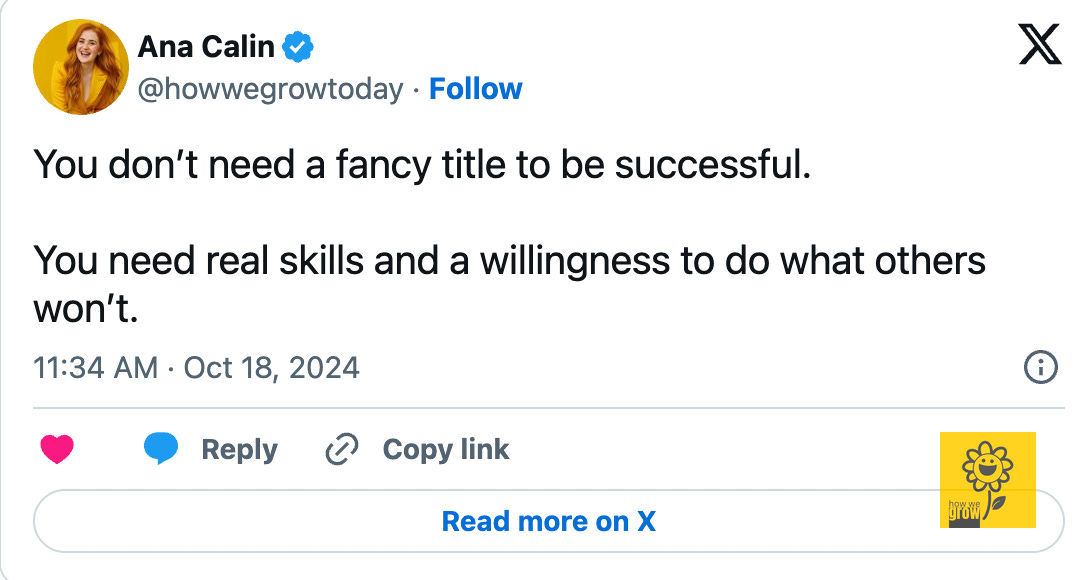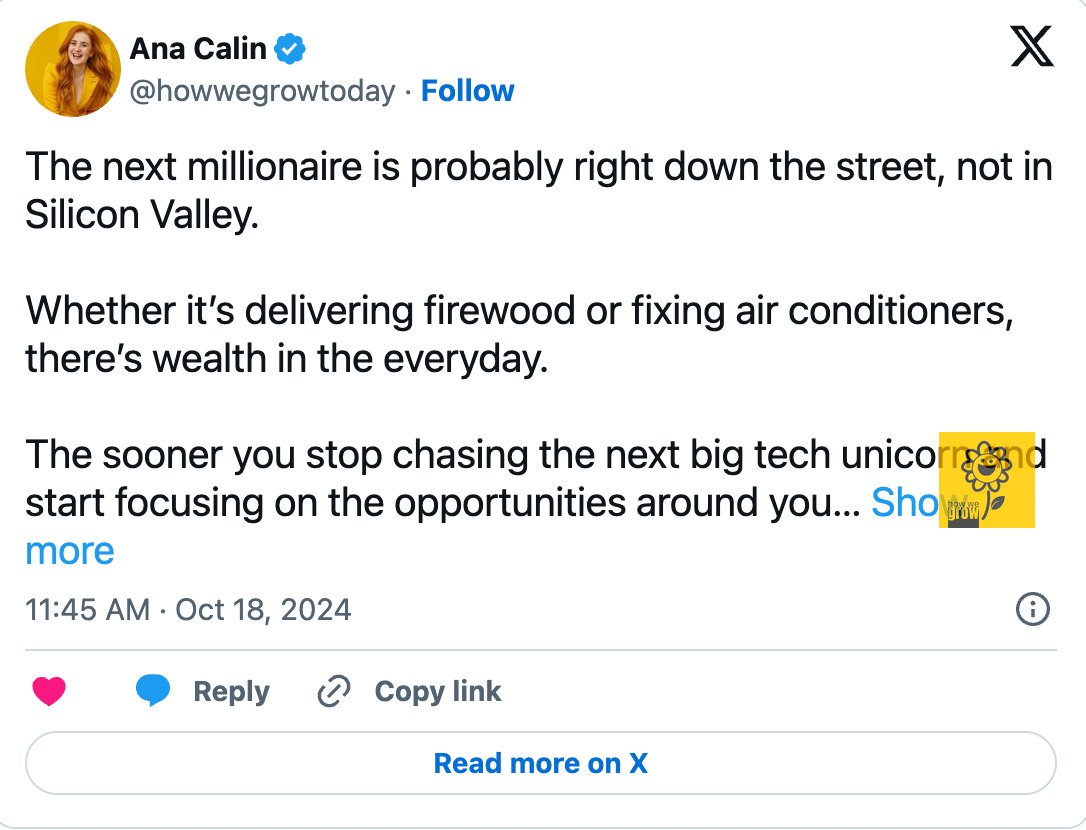But first, 3 ideas to consider about building a portfolio career this week:
I.
II.
Working for one company, in one role, is riskier than you think. Look at the local heroes—tradespeople, small business owners, and blue-collar experts. They’re the ones creating real, sustainable wealth.
A portfolio career lets you diversify your income, hedge against uncertainty, and build something that’s yours.
Ownership is the ultimate job security.
III.
Let’s get one thing straight: You’ve been sold a lie about building a career. Actually, you’ve been sold nine.
The world is full of half-truths, especially when it comes to success and wealth.
For years, we’ve been sold the idea that the only way to become a millionaire is aiming for the stars—launch a startup, create the next big app, or revolutionise an industry.
But what if I told you that the future millionaires aren't working on the next Facebook? They’re not in Silicon Valley. They're a lot closer than you think—probably even in your own backyard.
Let’s talk about how we’ve been sold a lie—and the truth behind the millionaires who are quietly building their wealth right under your nose.
Lie No 1: You Need to Build the Next Big Thing
Let’s get one thing straight: You don’t need to be working on some world-changing, futuristic idea to get rich.
Sure, SpaceX might be launching skyscrapers into the sky, but the truth is, some of the most financially successful people today are fixing your furnace, not chasing Mars.
Today’s biggest dirty secret: there’s a rising generation of millionaires who aren’t working on the next app, they’re going to trade school and unclogging your toilet.
Take a queue from the latest WSJ article if you don’t trust me (yet).
Then take Joe Martinez, a guy who started as an electrician.
He didn’t come from money, didn’t have a fancy degree, but what he had was grit.
Joe noticed that there was always demand for good electricians, but the big companies were slow, overpriced, and lacked personal service. So, he set up his own small shop, offering a more personalized touch.
Fast forward five years, and Joe’s not just an electrician anymore—he’s running a fleet of service trucks, managing teams, and pulling in well over a million dollars annually.
Joe’s not the exception. Look around—there are thousands of “Joe’s” who are slowly and steadily becoming millionaires by offering services that the rest of us rely on every day. It's not glamorous, but it's profitable.
It makes you wonder — could I do it, too?
Lie No 2: You Need to Be a Tech Genius
We’ve all heard the stories—Mark Zuckerberg built Facebook in his dorm room, Elon Musk is revolutionizing space travel, and Jeff Bezos started Amazon in his garage.
The media loves these stories because they’re big, bold, and shiny.
But here’s what they’re not telling you: for every Musk and Bezos, there’s a “Larry the plumber” who’s quietly pulling in seven figures fixing leaky pipes and broken toilets.
Larry, like many others, started small.
He didn't try to invent the next Uber. He didn’t need to.
All he needed was to be good at his trade and understand that consistency beats novelty.
Larry invested in marketing, customer service, and efficiency. Over time, word of mouth and reputation did the rest. Today, his plumbing business brings in more than most small tech startups could dream of, and it’s recession-proof.
Whether it’s tech or not, people always need someone to fix their plumbing.
Lie No 3: You Need a Massive Audience to Succeed
Thanks to social media influencers, there’s this idea that you need a huge audience or tons of followers to make money.
That’s BS.
You don’t need to go viral to be successful—you just need to provide value to the right people.
Think local, think small scale, think niche.
Daniella Green was a teacher who wanted to break into the online education space. But with no audience and no name recognition, she wasn’t sure how to start.
Instead of trying to appeal to everyone, she focused on a very specific niche: homeschooling parents. Daniella started a blog and created downloadable resources specifically for them.
She didn’t need a huge following—just a dedicated one. Today, her small but loyal audience generates enough income for her to leave teaching and run her online business full-time.
It’s not about the size of the crowd; it’s about how well you serve them.
Success isn’t about having the loudest voice, it’s about solving real problems for real people. You can build wealth by focusing on a small, engaged community rather than the masses.
Do you want to get your business/ service in front of 25,000 engaged creatives? Then let’s talk.
Lie No 4: It’s All About Fancy Titles
There’s a dirty little secret no one likes to talk about: Fancy titles don’t mean wealth.
In fact, more often than not, the people with prestigious titles—VPs, Directors, and Senior Executives—are tied to their jobs. Their salaries might be high, but they often live paycheck to paycheck, leveraged by mortgages, credit, and lifestyle inflation.
On the other hand, the people who seem “less successful” on the surface—like Maria, the HVAC contractor—are the ones quietly stacking wealth.
Maria didn’t care about titles. She cared about control.
She started by working for a larger company, but as she built her expertise and connections, she realized she could do the same thing for herself. Now, she owns her own HVAC business, has multiple crews working for her, and her bank account speaks volumes.
Her title? Owner.
Her wealth? Growing.
And she’s got the freedom to enjoy it.
Lie No 5: You Have to Live in a Big City to Make Big Money
Another myth that needs busting: The idea that you need to live in a major city to make serious money.
Cities are where the opportunity is, right? That’s what we’ve been led to believe. But in reality, the real opportunities are often in smaller towns, rural areas, and the places where big corporations won’t even think to go.
Just ask Rick Anderson. Rick doesn’t live in New York or San Francisco—he lives in a small town in the Midwest.
Rick noticed something while working his corporate job: nobody wanted to deliver firewood. People in his town used it for their fireplaces, but nobody was doing it efficiently or reliably. So Rick quit his corporate job and started a firewood delivery business.
Fast forward 10 years—Rick now has a thriving local business with multiple trucks, and he’s earning more than he ever did in his desk job.
Rick didn’t need the hustle of the city. He found his niche right where he was.
🚀 Book a strategy call with me to grow your personal brand and portfolio career.
I’ll teach you my system for building an impactful online presence that led to 1B+ views and $1M in brand deals. Learn more and read client success stories.
Lie No 6: Only College Graduates Can Build Wealth
College degrees are great, but they’re not a ticket to wealth. Just because you’ve got a diploma on the wall doesn’t mean you’ll ever touch seven figures.
The truth is, the people racking up massive wealth are often those who go the less traditional route.
Meet Samantha Lee. She skipped college altogether and went straight into the trades. Samantha became a welder at 19, and by 25, she was running her own fabrication shop.
Today, she’s got a team of welders, contracts with multiple construction companies, and is pulling in high six-figure revenue annually.
Her classmates? Most of them are still paying off student loans.
Samantha’s story isn’t unique. The *Main Street Millionaire* concept proves it—you don’t need to take on six figures of debt for a degree to make seven figures in your business.
---












